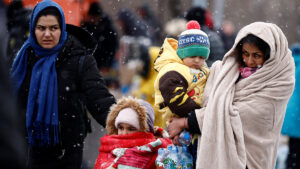Standing with Ukraine: How the crisis challenges our response to all refugees
Written by Hannah Munday

As smoke ascends from the streets of Ukraine, blitzed by Russian bombs in an unprovoked attack, thousands of civilians have been forced to seek sanctuary beyond their national borders. While some crawl out of Kyiv in endless queues of cars, others walk through the night to reach their neighbouring states. Many have left behind family members. All leave behind their homes.
More than one million civilians fled Ukraine in the first week of war alone, with a further 160,000 displaced within the country’s bounds. The majority who have succeeded in leaving the country, after waiting up to 60 hours to cross its borders, will shelter in next-door Poland, Hungary, Moldova, Slovakia and Romania. Further into Europe, countries such as Germany and Denmark have also shown preparedness to welcome those in flight, as well as to provide humanitarian support for those displaced internally and in Ukraine’s neighbouring countries. The United Nations predicts that up to 5 million people could be displaced by the conflict altogether.
While the sudden, almost exclusive turn of the international spotlight onto Ukraine is only right in its full-scale state of emergency, it should be remembered that it comes in the context of existing, albeit acutely escalated violence. By the time Putin deployed his military on 24 February, eight years of Russo-Ukrainian fighting in the far east of the country had already driven around 1.5 million people from their homes. While there has been a dramatic rise in the rate and reach of displacement and in the urgency of external aid, this refugee crisis did not begin with, and is not delimited by war. Its overnight movement from the relative margins to the very centre of international consciousness challenges our judgement of when forced migration matters. Does the search for human safety only reach “critical” status in our estimation when it exceeds a certain statistic at a certain speed, and when that statistic is pushed towards our own borders? Are we more appalled by the figures than distressed by the distinctive realities of individual suffering? If so, do we perceive the crisis as more ours than theirs?
Added to these concerns are the comparative responses of the international community to Ukrainian refugees versus those fleeing other global conflicts. The display of active solidarity with Ukraine is unmatched in scale and speed by any Western response to the years-long crises in Afghanistan, in Syria, in Somalia. And by emphasising the shock of war “on our doorstep”, by stating that its refugees are “intellectuals” who “look like us”, and by framing Putin’s invasion as an attack on “civilisation”, some media outlets have conveyed the deeply troubling attitude that the sufferings of “war in Europe” are to be taken more seriously than those in non-Western countries, where conflict is the supposed status quo and therefore less worthy of our attention. There is also danger that all-eclipsing attention on Ukraine will deflect awareness from other, ongoing refugee crises, resulting in still greater hardship for their already marginalised victims. Once again, this is not to say that outpourings of concern and compassion for those caught in the Ukrainian crisis are to be any less encouraged; rather the opposite. These themselves, by highlighting hypocrisies and hierarchies in international empathy, serve to call for the eradication of all scales of value in the safety of refugees around the world.
This call has been amplified by actions and attitudes from within Ukraine itself, from the front lines of the exodus. Growing numbers of BIPOC refugees, especially black students and families, have reported being blocked from accessing public transport in their search for safety. Others report having their entry to neighbouring countries denied or delayed in displays of indefensible racism, while white Ukrainians were welcomed with comparatively low resistance. In addition to raising awareness online and on social media, the students have received support from activists who have raised funds in recognition of the discrimination: for instance, two black women in the UK and another in Ukraine surpassed a £20,000 target in under 24 hours. However, no matter how commendable and effective such schemes may be, their very existence cries out for more to be done in eradicating racial biases against refugees, both in Ukraine and beyond, until national borders cease to be racial barriers.
As the conflict in Ukraine continues to unfold, we see afresh the need to fight against statistical, racial and geopolitical selectivity in our response to human need. Standing with Ukraine means standing with all refugees – regardless of how many there are, regardless of where they come from, and regardless of where they seek to go.
Please donate not just to those affected by Russia’s attack against Ukraine, but also to those affected by other ongoing humanitarian crises.